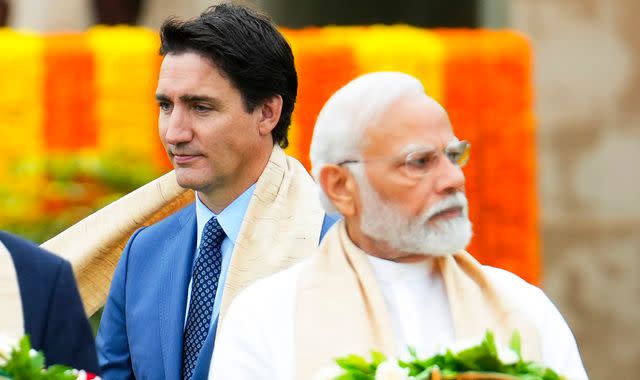Hardeep Singh Nijjar: Canada withdraws 41 diplomats from India over Sikh leader's murder dispute

Canada has withdrawn dozens of its diplomats from India after the Indian government said it would revoke their diplomatic immunity, amid an ongoing dispute over the murder of a Sikh separatist leader.
The move follows Canada's claims that India may have been involved in the June killing of Hardeep Singh Nijjar in the Canadian province of British Columbia.
Canada's foreign minister Melanie Joly said on Thursday 41 of the country's 62 diplomats in India have been removed, along with their dependants.
She said they were "in danger of having their immunity stripped on an arbitrary date" and this would put their personal safety at risk. It was for this reason Canada would not be reciprocating the action, she added.
"A unilateral revocation of the diplomatic privilege and immunity is contrary to international law and a clear violation of (the) Geneva Convention on diplomatic relations. Threatening to do so is unreasonable and escalatory," Ms Joly said.
"Given the implications of India's actions on the safety of our diplomats, we have facilitated their safe departure from India.
"If we allow the norm of diplomatic immunity to be broken, no diplomats anywhere on the planet would be safe. So for this reason, we will not reciprocate."
Exceptions have been made for the other 21 Canadian diplomats who will remain in India, she added.
Ties between the two countries have plunged to their lowest point in years after Justin Trudeau, Canada's prime minister, told parliament last month there are "credible allegations" India was involved in the killing of Mr Nijjar, a Sikh independence activist.
The claims have been dismissed by India as "absurd".
Read more world news:
Biden's warning over Putin and Hamas
While world's eyes are elsewhere, there are significant developments in Ukraine
Mr Nijjar, a 45-year-old Canadian citizen, was shot dead outside a Sikh temple in Surrey, British Columbia, on 18 June.
He was one of the key members of the Khalistan movement - and was in the process of organising an unofficial referendum on its proposed independent Sikh state before he died.
No one has been arrested over his killing.
Canada has yet to provide public evidence to back Mr Trudeau's allegations. Last month, however, it revealed the claims were based on intelligence provided by a major ally and surveillance of Indian diplomats in the country.


